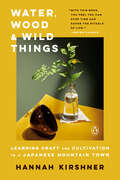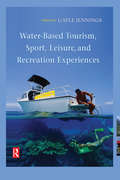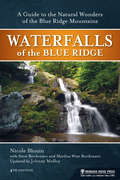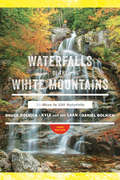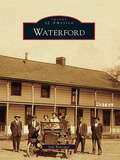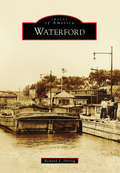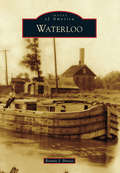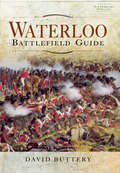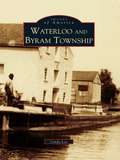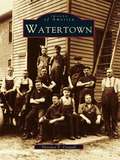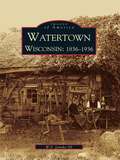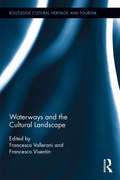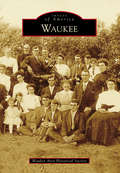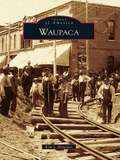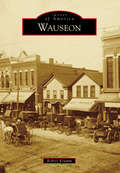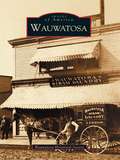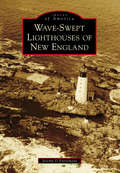- Table View
- List View
Water, Wood, and Wild Things: Learning Craft and Cultivation in a Japanese Mountain Town
by Hannah Kirshner"With this book, you feel you can stop time and savor the rituals of life." --Maira KalmanAn immersive journey through the culture and cuisine of one Japanese town, its forest, and its watershed--where ducks are hunted by net, saké is brewed from the purest mountain water, and charcoal is fired in stone kilns--by an American writer and food stylist who spent years working alongside artisansOne night, Brooklyn-based artist and food writer Hannah Kirshner received a life-changing invitation to apprentice with a "saké evangelist" in a misty Japanese mountain village called Yamanaka. In a rapidly modernizing Japan, the region--a stronghold of the country's old-fashioned ways--was quickly becoming a destination for chefs and artisans looking to learn about the traditions that have long shaped Japanese culture. Kirshner put on a vest and tie and took her place behind the saké bar. Before long, she met a community of craftspeople, farmers, and foragers--master woodturners, hunters, a paper artist, and a man making charcoal in his nearly abandoned village on the outskirts of town. Kirshner found each craftsperson not only exhibited an extraordinary dedication to their work but their distinct expertise contributed to the fabric of the local culture. Inspired by these masters, she devoted herself to learning how they work and live.Taking readers deep into evergreen forests, terraced rice fields, and smoke-filled workshops, Kirshner captures the centuries-old traditions still alive in Yamanaka. Water, Wood, and Wild Things invites readers to see what goes into making a fine bowl, a cup of tea, or a harvest of rice and introduces the masters who dedicate their lives to this work. Part travelogue, part meditation on the meaning of work, and full of her own beautiful drawings and recipes, Kirshner's refreshing book is an ode to a place and its people, as well as a profound examination of what it means to sustain traditions and find purpose in cultivation and craft.
Water-Based Tourism, Sport, Leisure, and Recreation Experiences
by Gayle JenningsWritten by a team of international contributors, from Australia, Europe and the USA, the text uses international case studies and examples to illustrate and highlight discussion.Contributors include: Paul Beedie, De Montfort University, UK; Kay Dimmock, Southern Cross University, Australia; Gary Easthope, University of Tasmania, Australia; Simon Hudson, University of Calgary, Canada; Gayle Jennings, Griffith University, Australia; Lilian Jonas, Jonas Consulting, USA; Les Killion, Central Queensland University, Australia; Gianna Moscardo, James Cook University, Australia; Harold Richins, Sierra Nevada College, USA; Chris Ryan, The University of Waikato, New Zealand.
Water: An Anthology from Short Story Day Africa
by Rachel Zadok Nick MulgrewShort Story Day Africa presents its annual anthology. The stories explore true and alternative African culture through a competition on the theme of Water. This is the third in the SSDA collection of anthologies, which aim to break the one-dimensional view of African storytelling and fiction writing.Short Story Day Africa brings together writers, readers, booksellers, publishers, teachers, and school children from all over the globe to write, submit, read, workshop, and discuss stories.Rachel Zadok is the author of two novels: Gem Squash Tokoloshe (2005) and Sister-Sister (2013). Nick Mulgrew is a freelance editor and a columnist for the Sunday Times, South Africa.
Waterfalls and Wildflowers in the Southern Appalachians
by Timothy P. SpiraIf you love waterfalls, here are some of the best hikes in the Southern Appalachians. And if you love plants--or simply would like to learn more about them--you will be in hiking heaven: naturalist Tim Spira's guidebook links waterfalls and wildflowers in a spectacularly beautiful region famous for both. Leading you to gorgeous waterfalls in Virginia, North Carolina, Tennessee, South Carolina, and Georgia, the book includes many hikes in the Great Smoky Mountains National Park and along the Blue Ridge Parkway. As he surveys one of America's most biologically diverse regions, Spira introduces hikers to the "natural communities" approach for identifying and understanding plants within the context of the habitats they occupy--equipping hikers to see and interpret landscapes in a new way.Each of the 30 hikes includes: * a detailed map and GPS coordinates* a lively trail description highlighting the plants you are most likely to see, as well as birds and other animals along the way* an associated plant species listAlso featured:* beautiful color photographs of 30 destination waterfalls, 125 plants, and more* detailed descriptions of 125 key plant species* 22 drawings to help identify plant structures* a glossary of botanical terms
Waterfalls of the Blue Ridge: A Hiking Guide to the Cascades of the Blue Ridge Mountains
by Johnny Molloy Nichole Blouin Marilou Weir Bordonaro Steve BordonaroWaterfalls of the Blue Ridge, now in its 4th edition, combines the pleasure of hiking with the wonder of one of nature's most captivating sights: waterfalls. <P><P>Outlining hikes that feature more than 110 waterfalls in the Blue Ridge Mountains, this guide has been updated with 30 new waterfalls, updates to existing routes, and new photos. Offering something for hikers of every level of experience, waterfalls range in height from 10 to 500 feet, some requiring no hike at all while others include hikes of up to 10 miles. In this guide, today's most experienced guidebook author Johnny Molloy teams up with Nicole Blouin and Marilou & Steve Bordonaro to introduce hikers to waterfalls spanning 2 states, 4 national forests, 3 national parks, and 8 state parks all throughout the Blue Ridge.
Waterfalls of the White Mountains (3rd Edition): 30 Hikes To 100 Waterfalls
by Bruce R. Bolnick Daniel Bolnick Kyle van der LaanExplore the scenic splendor of the White Mountains of New Hampshire with this guide to the Region’s Waterfalls The White Mountains of New Hampshire are home to many gushing, cascading waterfalls waiting to be discovered. This completely revised and updated edition of Waterfalls of the White Mountains outlines hiking trails ideal for observing the more than 100 waterfalls in the region, no matter experience level or ability. Each hike opens with the trail at a glance overview—including the distance, difficulty, altitude gain, and directions to the starting point. Helpful tips and suggestions are offered throughout, like the best times of year for each hike, best vantage points for viewing the falls, great swimming holes for cooling down, and uncrowded scenic treasures that are perfect for a woodland picnic. Also featuring labeled maps and fascinating short essays on local history and lore, Waterfalls of the White Mountains guides readers through their next excursion to the White Mountains of New Hampshire.
Waterford (Images of America)
by Jeff BenzigerNestled where the San Joaquin Valley begins rolling into the Sierra Nevada foothills, Waterford is steeped in a rich history. From its scenic Tuolumne River corridor, early gold seekers and travelers in untamed central California forded the summer stream here or crossed swollen winter flows by ferry. Waterford was originally named Bakersville for founder William W. Baker, who arrived by covered wagon in the 1850s. The fertile soil provided good farming and prosperity for disillusioned gold seekers. When an ingenious gravity irrigation system was introduced in the 1890s, farms thrived, drawing families, businesses, and churches. Rowdy saloons briefly flourished before stalwart citizens drove them out. Waterford's brave first settlers, farmers, and businessmen made their marks here, and included such visionaries as the Rudi brothers, longtime meat purveyors whose Waterford offspring included Oakland A's baseball legend Joe Rudi.
Waterford (Images of America)
by Richard F. HerzogWaterford, home to two rivers and three canals, conjures up images of and involvement in water by its very name. The native population enjoyed the bounty of the waters for subsidy and transportation. Europeans arrived by boat, seeking a passageway to the West, and their journey ended in Waterford. Early settlers realized the ability to ford the rivers and found the soil bountiful from frequent overflow. As land was farmed and developed, rivers were dammed for transport and harnessed for power, and canals were channeled. Water was being utilized but never truly controlled, as the floods of many seasons have demonstrated. The water in this area is a gift, but it can at times create great devastation. Waterfordians, from the pre-Columbian era to the present day, have learned to respect the power of the rivers.
Waterloo (Images of America)
by Bonnie J. BreeseLocated in the heart of the Finger Lakes of upstate New York is the quaint village of Waterloo in Seneca County. Because the village spanned both sides of the Seneca River, it was founded in two stages: the southern side in 1792 by Samuel Bear and the northern side in 1807 by Elisha Williams. It is best known as the birthplace of Memorial Day, which was first celebrated by the citizens of Waterloo in May 1866, one year after the end of the Civil War, to honor those lost. Waterloo was also where the women's rights movement was originally conceived. In the 1800s, it became a thriving industrial town manufacturing wagons, pianos, woolen goods, organs, and many other products. It is the home of the historic Scythe Tree, where farm boys hung their scythes before going off to war, and of Barney Oldfield, Louise Scherbyn, and Richard P. Hunt, among others.
Waterloo Battlefield Guide
by David ButteryA British military historian offers an expert introduction to The Battle of Waterloo in this essential companion for battlefield visitors. In Belgium on June 18th, 1915, the Battle of Waterloo marked the climax of the Napoleonic Wars—and a major turning point in world history. The combined forces of the Duke of Wellington and Field Marshal von Blücher delivered a devastating defeat to Napoleon. Though the outcome would have a major influence on the shape of Europe for more than a century, the battle itself cannot be properly understood without a detailed study of the landscape in which it was fought. Using eyewitness accounts and an intimate knowledge of the terrain, historian David Buttery vividly reconstructs the events of Waterloo as he takes readers across the battleground as it exists today. He provides essential context for understanding pivotal episodes in combat, including the day-long struggle for the chateau at Hougoumont, the massive French infantry assaults, repeated cavalry charges, the fall of La Haye Sainte, the violent clashes in the village of Plancenoit, the repulse of the Imperial Guard and rout of the French army.
Waterloo and Byram Township (Images of America)
by Cindy LeeThroughout its history, Byram Township has thrived upon its rich natural resources. Farmers worked its fertile soil and industrialists exploited the area's rolling hills--thickly forested and full of iron ore--long before Pennsylvania became the capital of the United States steel industry. Byram Township, however, is perhaps best known for its many lakes and ponds, which have spurred the community'sindustries, transportation, and recreation. During the nineteenth century, the township's rivers and lakes helped to form the Morris Canal, a man-made water highway for the transportation of cargo from Phillipsburg to Jersey City. Once a stop along the Morris Canal, Waterloo is now a historical attraction and a living testament to how Byram Township residents once lived and worked along the canal.
Watertown (Images of America)
by Donna M. DuttonWatertown began as a small hamlet of three cabins located in a wilderness. In time it grew to become the county seat of Jefferson and, from the early 1800s through the mid-1900s, a major industrial and trade center in northern New York State. With more than 200 images, Watertown tells the fascinating history of this community, once known as the Garland City. This pictorial history looks back at a time when horse-and-buggy travel was a way of life, when crowds gathered to cheer for the returning troops, and when life seemed less hectic. Here are the Watertown public square, the first ten churches that were built in town prior to 1850, and the faces of schoolchildren-the ancestors of today's residents. Also in view are the early days of the Watertown Police Department, the industries that supplied jobs for thousands, the mighty Black River which powered these industries, and Thompson Park and the Roswell P. Flower Memorial Library-two gifts donated by benefactors who anticipated the community's needs.
Watertown (Images of America)
by Florence T. CrowellHere, in stunning images and stirring narrative, is the history of Watertown, a community that lies near the center of western Connecticut. The town was once part of Mattatuck, a tract of land purchased from the Paugasett Indians in 1684. The fertile area first attracted Farmington residents, who settled down to farm the land. It was not until 1722, however, that the first sawmill was built. In time, new settlers joined the earlier families and, by 1739, they formed the parish of Westbury, which in turn was incorporated as Watertown in 1780. With more than two hundred unforgettable pictures, Watertown highlights the local men and women, buildings and churches, and neighborhoods and businesses that are the essential element of the town's lively history. It shows some of the nine one-room schoolhouses that children attended. It features the Taft School, a preparatory school for boys opened by Horace Taft in 1893; Mrs. Parke and her strange museum; and tavern keeper and farmer James Bishop. It proudly displays some of the firsts for Watertown: Merrit Heminway winding thread on spools, Wheeler-Wilson developing the lock-stitch sewing machine, and the Watertown Manufacturing Company designing and producing Lifetime Ware.
Watertown, Wisconsin: 1836-1936
by W. F. Jannke IIIWatertown, Wisconsin, nestled in the southeastern part of the state between the largest city, Milwaukee, and the state capital, Madison, was once considered the second largest city in Wisconsin. Founded in 1836 by Yankee settlers from the East coast, these individuals were soon joined by Irish and German immigrants who contributed to Watertown's unique cultural and ethnic make-up. The town was granted a village charter by 1849 and became a city in 1853. Watertown, Wisconsin: 1836-1936, explores this exciting era of growth and expansion in the city's first one hundred years. From the arrival of the stage line in 1844 to the new ideas and inventions presented in the twentieth century, the reader is able to gain insight into the development of this wonderful community. However, amidst all of this change, there is one thing that has remained constant--the people. Within the pages of this book, the lives of the residents of Watertown are represented through the images and the text, thus bringing to life the rich history of this community.
Waterways and the Cultural Landscape (Routledge Cultural Heritage and Tourism Series)
by Francesco Vallerani Francesco VisentinWater control and management have been fundamental to the building of human civilisation. In Europe, the regulation of major rivers, the digging of canals and the wetland reclamation schemes from the sixteenth to nineteenth centuries, generated new typologies of waterscapes with significant implications for the people who resided within them. This book explores the role of waterways as a form of heritage, culture and sense of place and the potential of this to underpin the development of cultural tourism. With a multidisciplinary approach across the social sciences and humanities, chapters explore how the control and management of water flows are among some of the most significant human activities to transform the natural environment. Based upon a wealth and breadth of European case studies, the book uncovers the complex relationships we have with waterways, the ways that they have been represented over recent centuries and the ways in which they continue to be redefined in different cultural contexts. Contributions recognise not only valuable assets of hydrology that are at the core of landscape management, but also more intangible aspects that matter to people, such as their familiarity, affecting what is understood as the fluvial sense of place. This highly original collection will be of interest to those working in cultural tourism, cultural geography, heritage studies, cultural history, landscape studies and leisure studies.
Watkins Glen International
by Bill Green Michael ArgetsingerIn 1948, Watkins Glen became the site of the first postwar road race in America on a 6.6-mile course through the village and surrounding highways; the present-day road course was built in 1956 and held its first race the same year. The circuit presented its first professional race in 1957 when NASCAR made its first appearance. NASCAR returned to the Glen in 1964 and 1965 and found a permanent spot on the Watkins Glen calendar beginning in 1986. Today, the annual NASCAR Sprint Cup Series race in August ranks as the largest spectator event in the state of New York. In addition to NASCAR and Formula One, Watkins Glen race fans have enjoyed America's greatest race series, including Indy car, Can-Am, Trans-Am, six-hour endurance for prototypes, and amateur sports car racing.
Watling Street: Travels Through Britain and Its Ever-Present Past
by John HiggsA journey along one of Britain's oldest roads, from Dover to Anglesey, in search of the hidden history that makes us who we are today.Long ago a path was created by the passage of feet tramping through endless forests. Gradually that path became a track, and the track became a road. It connected the White Cliffs of Dover to the Druid groves of the Welsh island of Anglesey, across a land that was first called Albion then Britain, Mercia and eventually England and Wales. Armies from Rome arrived and straightened this 444 kilometres of meandering track, which in the Dark Ages gained the name Watling Street. Today, this ancient road goes by many different names: the A2, the A5 and the M6 Toll. It is a palimpsest that is always being rewritten.Watling Street is a road of witches and ghosts, of queens and highwaymen, of history and myth, of Chaucer, Dickens and James Bond. Along this route Boudicca met her end, the Battle of Bosworth changed royal history, Bletchley Park code breakers cracked Nazi transmissions and Capability Brown remodelled the English landscape. The myriad people who use this road every day might think it unremarkable, but, as John Higgs shows, it hides its secrets in plain sight. Watling Street is not just the story of a route across our island, but an acutely observed, unexpected exploration of Britain and who we are today, told with wit and flair, and an unerring eye for the curious and surprising.Written and Read by John Higgs(p) Orion Publishing Group 2018
Watling Street: Travels Through Britain and Its Ever-Present Past
by John HiggsA journey along one of Britain's oldest roads, from Dover to Anglesey, in search of the hidden history that makes us who we are today.'A bravura piece of writing - Bill Bryson on acid' Tom HollandWinding its way from the White Cliffs of Dover to the Druid groves of Anglesey, the ancient road of Watling Street has gone by many different names. It is a road of witches and ghosts, of queens and highwaymen, of history and myth, of Bletchley Park codebreakers, Chaucer, Boudicca, Dickens and James Bond. But Watling Street is not just the story of a route across our island. It is an acutely observed exploration of Britain and who we are today, told with wit and an unerring eye for the curious and surprising.
Waukee
by Waukee Area Historical SocietyIn 1869, Gen. Lewis Addison Grant and Maj. William Ragan purchased the land around the Des Moines Valley Railroad bed owned by Cyrus W. Fisher in Walnut Township. A plat map was drawn, and Waukee began. The Des Moines Valley Railroad was completed in June 1869, and Waukee was incorporated in 1878. Work, family, and church were the centers of life, and agriculture was predominant in Walnut Township. The Harris Coal Mine opened in 1920 and closed in 1928. The Shuler Coal Mine, opened in 1921, employed 500 men and closed in 1949. Community events are still held at the historic Triangle. Waukee's first school, facilitated in 1870, was held in the Presbyterian church. Today, Waukee is the fastest-growing school district in Iowa. On April 16, 2014, the Waukee City Council unveiled plans for Kettlestone, a 1,500-acre mixed-use development that will include an outdoor town center, housing, retail space, green space, trails, and an amphitheater.
Waukegan, Illinois
by Waukegan Historical SocietyWaukegan, Illinois has a long history, with a rich and varied heritage. Countless individuals, businesses, and organizations have contributed to that heritage, and continue today to contribute to the legacy of this community. One of Waukegan's most notable citizens was Jack Benny. Throughout his long career he regularly cited his hometown and its influence on him, and he often contributed to the city with his many appearances. But he wasn't the only person to bring fame to Waukegan. Edward Amet's motion picture projector and Johnson's outboard motors made Waukegan memorable in the minds of millions. And Louise Dekoven Bowen's generosity is a source of pride to its residents.
Waupaca
by Kim J. HeltemesIn 1849, the Native American lands of central Wisconsin were opened, by way of treaty, for land claims by settlers. The area of eastcentral Wisconsin was a favorite to men from Vermont. Vermont men had settled the wild country from Poy Sippi to Waupaca--a stretch of about 15 miles. That year, the county's earliest pioneers set out from Sheboygan to stake a claim for their homesteads. Told of a place called "the Falls," now known as Waupaca, they mapped out three 80-acre plots after their arrival. As more settlers came to the area, Waupaca was formed into a village and incorporated in 1857. The accumulation of vintage photographs that appear in Waupaca depict the town's old way of life in a vivid manner.
Wauseon
by Robert KrummFounded in 1852 amid dense forests and the mosquito-infested Great Black Swamp, Wauseon became the county seat of one of the last areas in Ohio to be settled. Named in honor of a local Potawatomi chief, Wauseon is the birthplace of Ohio's last surviving Civil War veteran and early race car legend Barney Oldfield. Wauseon was one of the first communities in the United States to implement rural mail delivery and establish a public phone service. Among its manufacturing operations is a company that made flashlights used on the Apollo moon landings. Wauseon is truly a city people take to heart, reflecting strong Midwestern values.
Wauwatosa
by Wauwatosa Historical SocietyFirst called Hart's Mills, after its founder Charles Hart who settled here in 1835, early Wauwatosa resembled a New England village, complete with a commons. Its first pioneers were Yankees and New Yorkers, later joined by Germans who would mold the growing community. Wauwatosa became the most highly developed, unincorporated settlement in Milwaukee County. It attained a degree of sophistication with its commercial mix of mills, a pickle factory, inns, modest businesses, and nearby stone quarries and breweries. Vital links to Milwaukee in 1851, the Watertown Plank Road and the state's first railroad through the village center to Waukesha, enhanced this development. In 1852, the County Board selected a site nearby for its poor farm. Wauwatosa incorporated as a village in 1892, attaining city status in 1897. The streetcar of the 1890s and the automobile fueled residential growth. Wauwatosa became known as the "City of Homes." In the 1950s, Wauwatosa tripled in size with final annexations and was transformed into a major center of commercial and industrial development, while retaining large public green spaces, parkways, and recreational sites.
Wave-Swept Lighthouses of New England (Images of America)
by Jeremy D’EntremontThe lighthouse is a pervasive icon in our culture, often used to symbolize positive qualities like faith, guidance, strength, and steadfastness. No structures embody these qualities more than wave-swept lighthouses, which were built to withstand the most extreme forces of wind and ocean waves, often in isolated, rocky locations far offshore. In the United States, the earliest attempts to build wave-swept lighthouses in the 1830s led to several masterpieces of engineering, a few of which are in the New England region. This book primarily focuses on six such structures: Whaleback (Maine), Saddleback Ledge (Maine), Minot's Ledge (Massachusetts), Halfway Rock (Maine), Graves Ledge (Massachusetts), and Ram Island Ledge (Maine). All of these wave-swept lighthouses stand in rugged testimony to the people who designed and built them, and they also serve to remind us of the struggles and sacrifices of the lighthouse keepers who "kept a good light" for so many years before automation.
Waxahachie: Where Cotton Reigned King
by Kelly Mcmichael StottThe people of Waxahachie, Texas, have always been at the heart of a thriving community that was once the largest cotton-producing county in the nation. As county seat, Waxahachie burgeoned into a bustling center for business and education and carved out a unique niche in the growing landscape. But its citizens overcame significant obstacles as well, facing such challenges as a massive slave revolt during the Civil War and the economic bust of the 1930s. Reflecting both the glory and hardship of these struggles, Waxahachie today stands as a testament to Southern determination and how a town came to be defined by a crop on which America still relies-cotton.Always with an eye on their future, the people of Waxahachie, in 1912, supported the development of an interurban electric railway system linking them to Dallas and Waco. Each July between 1900 and 1930, Texans from all over the state came to Waxahachie by covered wagon, on horseback, and later by automobile to participate in the national Chautauqua phenomenon and hear such great orators as William Jennings Bryan and Will Rogers. Waxahachie's Chautauqua Auditorium, still in use today, is one of the few national survivors of this educational movement. This tradition of community and culture survives to the present day in such events as the Scarborough Fair, the National Polka Festival, and the Gingerbread Trail of Homes. In this new historical account, Waxahachie, Texas: Where Cotton Reigned King, the town springs to life in a blend of more than 100 vintage photographs and stories that chronicle the perseverance and love of a people for their town.
